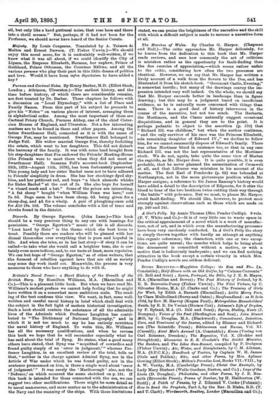The Marches of Wales. By Charles G. Harper. (Chapman and
Hall.)—The critic approaches Mr. Harper delicately, for he learns from the dedication to this book that Mr. Harper reads reviews, and sees how commonly the art of criticism is mistaken rather as the opportunity for fault-finding than the due exercise of appreciation,—which seems rather unfair to the critic, considering how often the two processes are identical. However, we can say that Mr. Harper has written a lively account of a walk from the Severn to the Dee, and has illustrated it from his sketch-book. " Grosmont Castle, Evening," is somewhat terrific ; but many of the drawings convey the im- pression intended very well indeed. On the whole, we should say that Mr. Harper succeeds better in landscape than in figure drawing ; but this may be a judgment based on insufficient evidence, as he is naturally more concerned with things than men. There is a good deal of history interwoven in the course of the narrative, but not too much. The Herbert's, the Mortimers, and the Clams naturally suggest occasional disquisitions, and in general they are to the point. It is perhaps pedantic to object to the assertion (p. 179) that " Richard III. was childless," but when the author continues, " and the only survivor of his race was the Princess Elizabeth, sole remaining daughter of Edward IV.," we decline to follow him, for we cannot summarily dispose of Edward's family. There was other Mortimer blood in existence too, so that in any case Richard III. was not the last representative of the Mortimer stock. We do not, again, take quite the same view of Marten the regicide, as Mr. Harper does. It is quite possible, it is even probable, that he never planned the assassination of Cromwell at all, and that Lilburne was mistaken in his account of the matter. The first Earl of Pembroke (p. 62) was beheaded at Northampton, not in the more picturesque position which Mr. Harper assigns ; a reference to Sir James Ramsay's history would have added a detail to the description of Edgecote, for it stirs the blood to hear of the two brothers twice cutting their way through "the battle" with pole-axes. But we must, to please Mr. Harper, avoid faultfinding. We should like, however, to protest most strongly against observations such as those which are made on pp. 240 and 241.


































 Previous page
Previous page